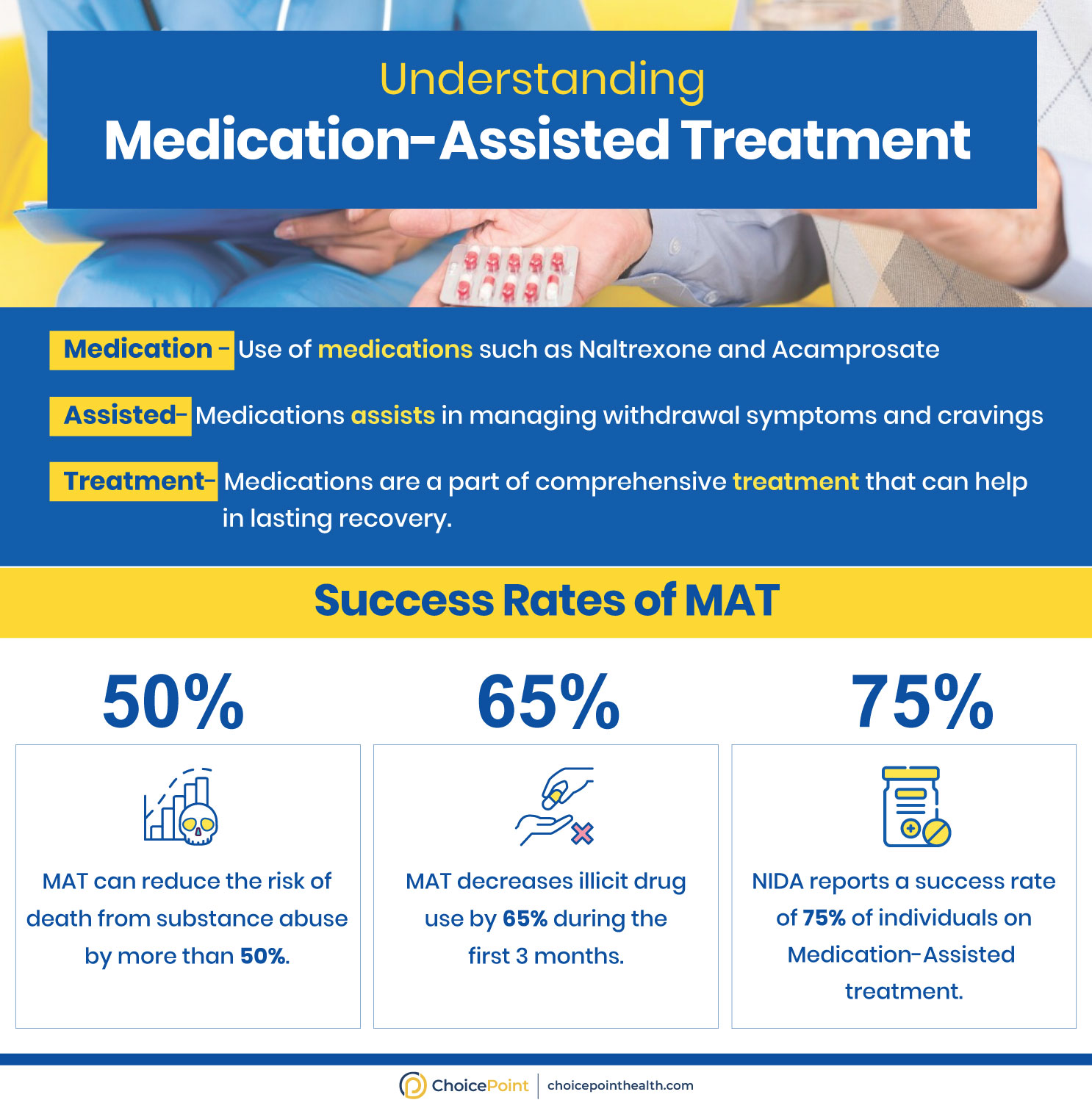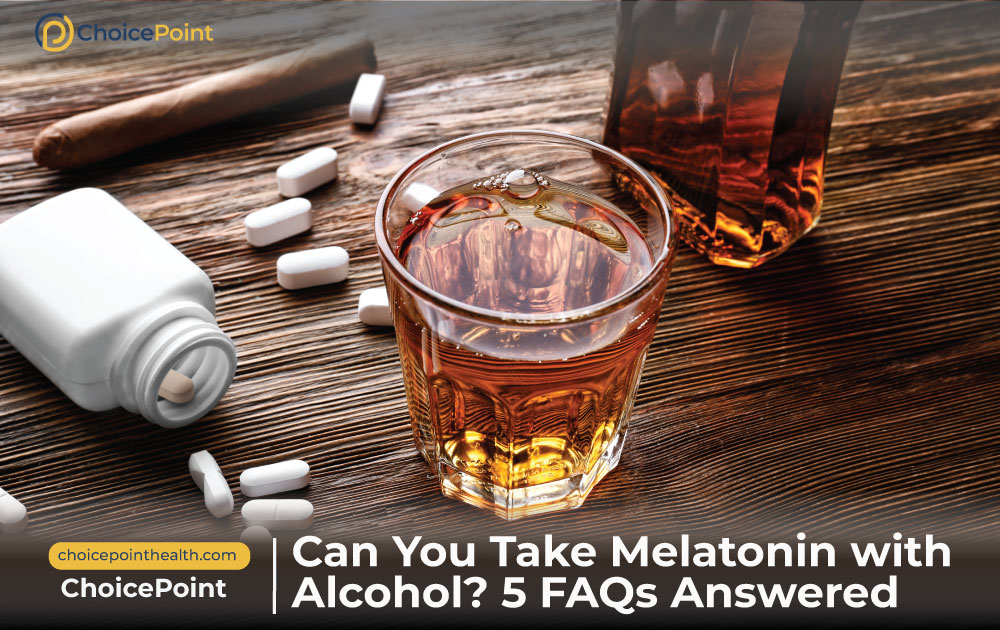The straightforward answer is a big No! At high doses, the sedative effects of alcohol and supplemental Melatonin can be amplified, which may lead to:
- Breathing difficulties
- Drowsiness
- Unconsciousness in extreme cases
It has been reported that 70% of people diagnosed with alcohol use disorder suffer from sleep disorders. While combining alcohol with Melatonin to promote sleep may seem like an attractive option, Is it safe? Read on to find out about the dangerous effects of mixing alcohol with the most popular sleep supplement, Melatonin, you or your loved one might be using.
ChoicePoint offers virtual and in-person addiction treatment plans for people suffering from prescription medication and substance abuse. Please call us at 844.445.2565 or visit the Fairlawn, New Jersey, center to learn more.
Table of Contents
Why Do People Take Alcohol With Melatonin?
Melatonin and alcohol are both sedatives; what could go wrong if I mix both? You will better understand the dynamic by exploring the bigger picture and understanding how Melatonin and alcohol influence sleep.
Melatonin is a hormone naturally present in the body. Its production in the brain is usually triggered by darkness. It helps with sleep, circadian rhythms, and certain conditions, such as:
- Jet lag
- Insomnia
- Delayed sleep-wake phase disorder (DSPW)
- Sleep disorders in children
- Anxiety before surgery
The majority of people think alcohol is a stimulant, but in reality, it is a sedative. It has been known to reduce the levels of natural Melatonin and sleep regulators in the body. This disruption may lead to insomnia and other sleeping disorders. Melatonin supplements are available over the counter. People often self-medicate to improve their sleep. Though it is safe to use in recommended doses, it is not the complete treatment for insomnia or any sleep disorders.

Here Is An Alarming Fact! A study reported that the content of 71%of Melatonin supplements varied by -85% to +478%. Chewable tablets were found to have 9 mg of Melatonin instead of the claims of 1.5mg dosage.

Here Is An Alarming Fact? A study reported that the content of 71%of Melatonin supplements varied by -85% to +478%. Chewable tablets were found to have 9 mg of Melatonin instead of the claims of 1.5mg dosage.
What Happens If You Take Melatonin With Alcohol
Even at low doses, this combination does not ensure better sleep. Dr. Goldberg reports, “Even though the combination may make you drowsy, you’re not getting good quality sleep.”
People who frequently use this combination may experience melatonin and alcohol side effects such as:
- Increased anxiety
- Dizziness, which can make walking and driving difficult
- Trouble breathing
- Passing out
- Shivering
- Flushing in upper face and body
- Abnormally fast heartbeat
In addition to melatonin, some people also mix alcohol with Suboxone, Tramadol, and Xanax. Drinking with any sedative medicines can lead to extreme drowsiness and unconsciousness in extreme cases.

Did You Know? Alcohol has life-threatening side effects on the liver. Of all lover cirrhosis deaths in 2019, 50% were due to alcohol abuse.

Did You Know? Alcohol has life-threatening side effects on the liver. Of all lover cirrhosis deaths in 2019, 50% were due to alcohol abuse.
5 Most Frequently Asked Questions Related to Can You Take Melatonin with Alcohol?
While alcohol abuse is responsible for the deaths of over 380 people every day in the United States, the sales of Melatonin are also growing by 10% each year. This increase demands a better understanding of this widely available product. Melatonin is not an FDA-approved or regulated product. You must be cautious about its use. Look at the most frequently asked questions to expand your knowledge about Melatonin and alcohol use.
1. How Long Should I Wait To Take Melatonin After Consuming Alcohol?
Melatonin will work best if you have no alcohol in your body. Generally, you should wait at least 2-3 hours after drinking alcohol. But the duration also depends on:
- How much alcohol you have consumed
- The strength of alcohol used
If you have been binge drinking, it is best to avoid taking Melatonin for at least 24 hours.
2. What Is a Melatonin Hangover?
Melatonin is known to cause drowsiness. If the drowsiness lingers for more than 24 hours, it is called a Melatonin hangover. Some other side effects include:
- Headache
- Nausea
- Dizziness
- Feeling sleepy at a time
- Restlessness
- Irritable and dry mouth
3. Are There Any Incidents of Melatonin and Alcohol Deaths?
There are no reports of adult deaths caused by direct consumption of Melatonin and alcohol. However, overdose may lead to accidental deaths, such as falling asleep while driving. But, there have been reports of increasing Melatonin overdose among teens and children. More than 4000 teens have been hospitalized in 2021, and seven children were reported dead due to Melatonin toxicity.
4. I Accidentally Took Alcohol and Melatonin. What Should I Do?
At low doses, taking Melatonin and alcohol should not pose any life-threatening effects. It is important to stay calm and follow the following steps:
- Be mindful of the adverse side effects, such as extreme drowsiness and breathing problems.
- Do not drive straight away or indulge in any activities that require focus.
- Call poison control, alcohol abuse hotline, or 911 right away.
- In case of allergic reactions, an EpiPen may be used. But call emergency services immediately.
5. Drinking Alcohol With Melatonin Makes Me Sleep Better. Does This Mean I Am Addicted?
If you are indulging in drinking with Melatonin daily, then you might probably be getting addicted to this combination. The problem with addiction is that it puts a person in denial. Most people who have an addiction are not ready to accept that they have a problem. But, addiction is not any different from other medical conditions that require medical intervention. There is no shame in asking for help.
If you think you or a loved one is suffering from substance abuse, please look for these signs according to the DSM-V criteria:
- Consuming Melatonin or alcohol in large amounts
- Consuming the substance for a longer time than initially intended
- Experiencing cravings when you decide to stop the use
- Experiencing withdrawal symptoms when abstaining from the use
- Neglecting social and work life
- Developing tolerance to the initial doses and increasing the dose to get the desired effects.
You can also find out through addiction assessment tests if your occasional use is turning into addiction.
Please note this assessment is an initial self-screening, and it is not meant to be a medical assessment or clinical diagnosis of addiction. For proper diagnosis and treatment, schedule an appointment with ChoicePoint.

Did You Know? In 2019, 50% of drug overdose deaths involved multiple drugs.

Did You Know? In 2019, 50% of drug overdose deaths involved multiple drugs.
A Better Option Than Taking Melatonin and Alcohol For Sleep
Though Melatonin and Alcohol may seem like a perfect combination for sleep, in reality, it is otherwise. Polysubstance abuse can mess up the normal function of the body. It can lead to:
- Depression
- Anxiety
- Disrupted sleep cycles
- Impaired judgment
- Blacking out (not remembering anything)
While Melatonin is safe, ask yourself why you are even taking it. Are you using these substances to mask a more significant problem? Addressing the troubling issue will help you lead a peaceful life. If you are suffering from polysubstance abuse, do not let the negative stigma or peer pressure stand in your way to lead a happy, healthy, and more peaceful life.

How Effective is Medication-Assisted Treatment for Addiction?
Recovery From PolySubstance Abuse
A medical alcohol detox is the best treatment available to treat substance abuse. Medication-assisted treatment in detox will help you abstain from alcohol.
At ChoicePoint, our doctors apply the latest treatment strategies to make the recovery journey as easy and safe as possible. You may be prescribed medications to reduce cravings and manage withdrawal symptoms.
Some of these medications may include:
- Naltrexone – FDA-approved medication used for alcohol use disorder
- Acamprosate – Helps to prevent relapse and alcohol cravings in people who have stopped drinking.
- Disulfiram – Blocks the effects of alcohol in the body.
Through therapy, we will start your mental and emotional healing process. The therapist will listen to your challenges and work with you to help you break free of troubling thoughts and emotions. Our highly structured behavioral therapy programs aim to help you adopt a more positive perspective, ultimately leading to a better quality of life.
In Conclusion, Can I Take Melatonin With Alcohol?
In conclusion to the question, can I take melatonin with alcohol? You should avoid taking Melatonin with alcohol as it can lead to extreme drowsiness and unconsciousness. You should also be mindful of the bigger picture, which is that neither alcohol nor melatonin are solutions to the problems you might be facing.
If you or a loved one is suffering from substance abuse, please know that it is never too late to ask for help. You deserve to get better and lead a happier life. To schedule an appointment, please call us at 844.445.2565.
What A Client At ChoicePoint Has to Say
I attended the Intensive Outpatient Program for five months. I could not be there in person, so I chose the virtual meeting option. The instructors were well-informed and knowledgeable. Some of them were sober addicts/alcoholics in the past and served as a great example of recovery success. My idol instructor is James Collins, who taught the evening sessions. Samantha M was my counselor and was attentive to my recovery progress. I learned so much about relapse management skills, the root causes of my addiction, and the many emotional and psychological deficits that caused my addiction. I highly trust and recommend this facility to anyone who has an addiction and is looking for recovery and a sober lifestyle.
What A Client At ChoicePoint Has to Say
I attended the Intensive Outpatient Program for five months. I could not be there in person, so I chose the virtual meeting option. The instructors were well-informed and knowledgeable. Some of them were sober addicts/alcoholics in the past and served as a great example of recovery success. My idol instructor is James Collins, who taught the evening sessions. Samantha M was my counselor and was attentive to my recovery progress. I learned so much about relapse management skills, the root causes of my addiction, and the many emotional and psychological deficits that caused my addiction. I highly trust and recommend this facility to anyone who has an addiction and is looking for recovery and a sober lifestyle.
People Often Ask Us These Questions About Melatonin And Alcohol Use
More of your questions are answered below:
What Not To Mix With Melatonin?
According to NHS, you should avoid following medications
- Antidepressants
- Benzodiazepines
- Blood pressure-lowering medications
- Alcohol
- Opiates
- Other medications for insomnia
Is 10mg of Melatonin too much?
Yes, 10mg is usually the upper limit. Healthcare professionals do not recommend more than 10 mg of Melatonin.
If your sleep is not improving after Melatonin, it is best to speak with a healthcare professional to find the underlying causes of the disrupted sleep cycles.
Can I Crush Melatonin and Put It In A Drink?
No drinking with Melatonin is not recommended. Both alcohol and Melatonin act as sedatives and can accelerate the effects of one other, causing extreme drowsiness, unconsciousness, and accidental injuries.
Can I Take Melatonin 3 Hours After Drinking?
Generally, it is safe to take Melatonin 3 hours after drinking. But the duration also depends on how much you drink. If you have been binge drinking, then it is recommended to avoid taking Melatonin for more than 24 hours.
Medical Disclaimer:
ChoicePoint aims to improve the quality of life for people struggling with substance use disorder and mental health issues. Our team of licensed medical professionals research, edit and review the content before publishing. However, this information is not intended to be a substitute for professional medical advice, diagnosis, or treatment. For medical advice please consult your physicians or ChoicePoint's qualified staff.









